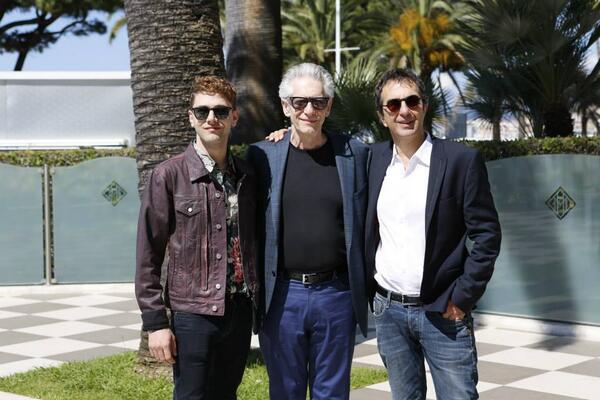Reviews include Irena’s Vow, The Beast, and Before I Change My Mind.
In a Future Canada: Sizing Up Canada’s Oscar Hopeful Mommy
September 25, 2014
Editor’s note: Xavier Dolan’s Mommy was recently named Canada’s 2014 Best Foreign Language Film Oscar submission.
For all the hubbub surrounding the tender age of the prolific and now potentially Oscar-bound Xavier Dolan, relatively little attention has been paid to his idiosyncrasy as a Canadian filmmaker.

Photographed at this year’s Cannes Film Festival, posed beside his competitors and fellow countrymen David Cronenberg and Atom Egoyan, the septuagenerian trickster and the svelte modernist, respectively, Dolan looked positively sanguine, and not just for his twenty-some years versus their cumulative century and change. Whatever you think of Mommy—and Toronto film critics aren’t so sure, ranging from Susan G. Cole’s assertion that Dolan is Canada’s best working filmmaker in these hallowed halls to Adam Nayman’s earnest effort to grapple with his affective pull on viewers in the current issue of Cinema Scope—its ecstatic aesthetic and unabashed melodrama make it an odd representative for a national cinema better known for its penchant for weird sex and snowshoes. Paradoxically, it’s the very features that make it an unusual national representative that put the film in good standing with many of Canada’s recent submissions, including the ones that made it to Oscar night.
If Mommy is a curiously emotional, direct, even at times florid international emissary for such an austere national cinema, often represented at festivals abroad since the 1990s by those high profile Anglophone heroes, it might have something to do with its maker’s proud Quebecois origins. Asked whether he considered himself either a Canadian generally or a Canadian filmmaker more particularly in an appearance on George Strombolopolous Tonight in support of Laurence Anyways, Dolan wavered between national points of identification. “I define myself as a Canadian person because I live in Canada,”he explained, after a moment of hesitation. “I define myself as a Quebecois filmmaker,” he added, “because my movies are soaked with the Quebecois attitude and culture and language.”
Though saying as much risks painting comparably minimalist Quebecois filmmakers like Denis Coté and Stephane Lafleur with an overly broad brush, that’s certainly also true of Mommy, a film that demanded French as well as English subtitles when it premiered in Cannes. “No French will ever understand this movie,” Dolan joked to Chris Knight in the National Post after that first screening, citing the distinct “perfume” of its Quebecois slang, which also manifests in his characters’ tendency—untranslated and all the more alien to outsiders for it—to throw air quotes around their scattered bits of English. This is to say nothing of a climax that finds its central trio communing over a song by the pre-Titanic, pre-global, and even pre-national superstardom of Celine Dion. That Dolan’s Quebecois sensibility is more or less intact with Mommy is especially surprising—and perhaps heartening—after the film’s opening gambit, a title card that situates what follows in a dystopian future Canada where parents can deposit their wayward youths in institutions at will. Even Dolan’s Canada, Mommy suggests, is regionalist first.

Its regional perfume puts Mommy slightly out of step with Canada’s recent successful Oscar submissions even as it fits it into a tradition of nominees that represented the nation as something other than Egoyan and Cronenberg’s fractured, alienated, Toronto-centric urban nightmares. Last year’s submission Gabrielle broke more than just Canada’s nomination streak after a solid run with Denis Villeneuve’s Incendies, Philippe Falardeau’s Monsieur Lazhar, and Kim Nguyen’s Rebelle. It was also the first of that group to stay more or less grounded in Quebec. Despite the geographic indeterminacy of Incendies’ vaguely Middle-Eastern setting, it marked what might be called a transnational turn in Canada’s recent award hopefuls—an awareness of cities like Montreal as global hubs or destination points for diasporic communities. In that context, Mommy feels like a return to the more local flavour of films like the nation’s lone Oscar winner, Denys Arcand’s The Barbarian Invasions.
That isn’t to suggest that any of these films are especially exotic, either to English Canadians watching Mommy without a French-Canadian concordance at hand or to French viewers scanning the subtitles for traces of their own language. Deep cuts from Celine Dion aside, there’s nothing too threatening about the local colour of Dolan’s semi-dystopian, mostly inviting Quebecois Canada, just as there wasn’t anything particularly radical about Falardeau’s quietly transnational classroom. Yet it is refreshing to think that Canada’s recent Oscar contenders might at least be raising complicated questions about how the local and the global fit into our sense of the national.
In Prizing Literature, her recent survey of the relationship between national prize culture and ideas of hospitality and accommodation, Gillian Roberts proposes that extra-national prizes like the Booker or the Pulitzer —to which we might add the Oscar —have conferred a sort of honorary cultural citizenship on authors who have previously strained under Anglo-Protestant assumptions about what proper Canadian texts ought to look like. Dolan doesn’t exactly need a passport to feel sufficiently Canadian, but one suspects an Oscar nomination wouldn’t hurt.



